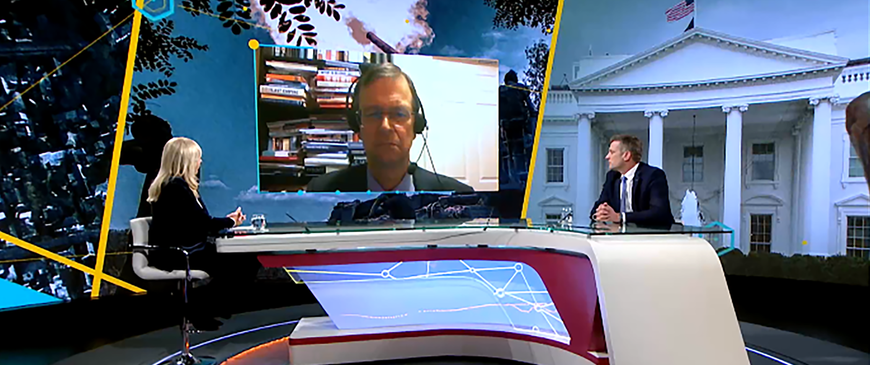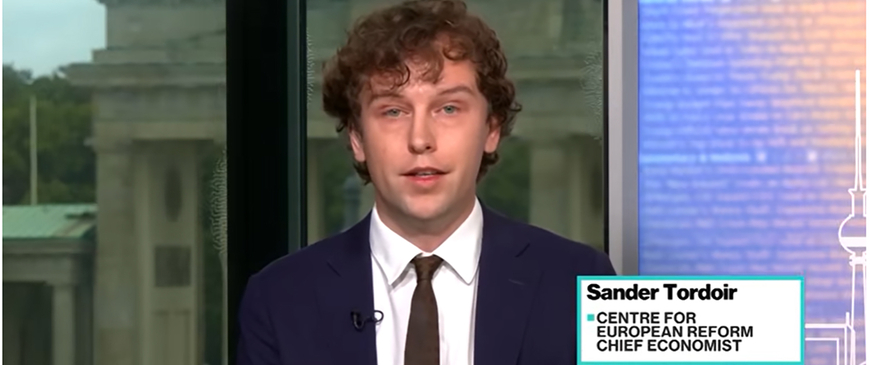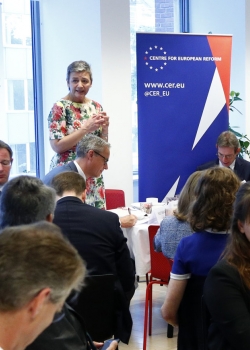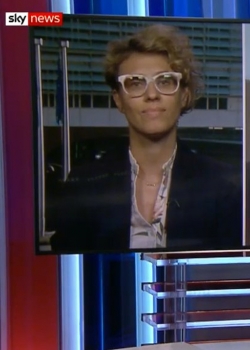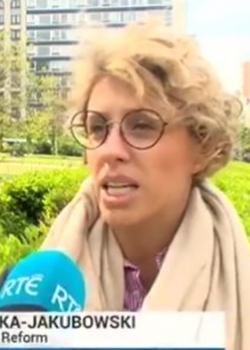Press
Google complying with EU order in shopping case, says EU's Vestager
22 May 2019
Reuters
European Competition Commissioner Margrethe Vestager said the measure appeared to be working.“Now we are in a situation where in 75 percent of queries there would be at least one rival to Google in the shopping box and 40 per cent of clicks would go to a merchant hosted by one of the rivals,” Vestager told reporters on the sidelines of a Centre for European Reform event. “This means we do not have a non-compliance case but at the same time also means that we keep monitoring monthly developments,” she added.
Right-wing populists prepare for surge in Euro elections
22 May 2019
iNews
Mr Macron has built up the contest as a struggle of good against evil. But having bested Mrs Le Pen in the 2017 French presidential elections, Mr Macron’s LREM is trailing her party this time round. “If he is humiliated, he will be weakened at home, and he will weaken his authority in Europe,” says Charles Grant, the director of the London-based Centre for European Reform (CER).
Sky News: Is populist politics a threat to the EU?
21 May 2019
Agata Gostyńska-Jakubowska, a senior research fellow at the Centre for European Reform spoke on Sky News today on populist politics, and if they threaten the EU (at approx 10.45 BST).
RTÉ News: The rise of populism in Europe
21 May 2019
Agata Gostyńska-Jakubowska a senior research fellow at the Centre for European Reform spoke to RTÉ News about the rise for populism in Europe (from 0.55 seconds).
Elections set to quantify rise of populism in Europe
21 May 2019
RTE News
"This reflects a more general trend that we used to see at the national level, which is now happening at the European level" says Agata Gostyńska-Jakubowska, a senior research fellow with the Centre for European Reform (CER)."The general public is no longer voting for the same parties their entire lives, the links between class, education and your political affiliations is less obvious. People are voting for different movements, very often for movements which have a one issue manifesto."
CER podcast: European Parliament elections special
20 May 2019
Beth Oppenheim talks to the CER's experts about the upcoming European Parliament elections.
Europarlament - rośnie w siłę, ale coraz słabiej przyciąga wyborców
20 May 2019
Forsal
Ekspertka z think tanku Centre for European Reform Agata Gostyńska-Jakubowska upatruje przyczyn tej tendencji w tym, że główne siły polityczne w Europie niewiele różnią się w kluczowych kwestiach. "To powoduje, że dla wyborców coraz bardziej atrakcyjne stają się partie radykalne, nie tylko antyeuropejskie, lecz również proeuropejskie, oferujące odważne propozycje dla przyszłości projektu europejskiego" - powiedziała PAP analityczka.
EU parliament's €114m-a-year move to Strasbourg 'a waste of money', but will it ever be scrapped?
20 May 2019
Euronews
"The biggest obstacle is the French government," said Camino Mortera-Martinez, a senior research fellow for EU justice and home affairs at the Centre for European Reform.
EP rinkimai Lenkijoje: valdantieji liberalus bando mušti euro, LGBT ir Bažnyčios kortomis
19 May 2019
15min
EP rinkimai, žinoma, neprilygsta balsavimui renkant parlamentą, kuris turi įvykti iki šių metų lapkričio. Kaip 15min teigė Europos reformų centro (CER) analitikė Agata Gostynska-Jakubowska, „visos partijos jau ruošiasi, pripažinkime, svarbesniems parlamento rinkimams“.
European elections will gauge the power of populism
19 May 2019
The New York Times
Agata Gostyńska-Jakubowska, a senior research fellow with the Centre for European Reform in Brussels, said the Austria scandal is timely ammunition for those who warn that many populist parties are deeply compromised by their ties to Mr Putin. “It emboldens those who question the populists’ good intentions and who call for greater transparency in the way these parties have been funded and investigations into their links to Russia,” she said.
Too much has been sacrificed to allow Brexit to destroy Europe’s unity
19 May 2019
The Guardian
Indeed, that well-informed commentator on Europe, Charles Grant, reports in a bulletin from the Centre for European Reform entitled The Brussels View of Brexit that Michel Barnier, leader of the European commission’s negotiating team, is so exasperated, along with President Macron himself, that the French are now in the “we are better off without the British” camp. They wanted a short extension of the article 50 deadline because “the British would not work out what they wanted unless faced with the precipice of a no-deal exit”.
Are we on the verge of committing an extraordinary act of self-harm?
17 May 2019
The Telegraph
In an area like food hygiene, explains Sam Lowe at the Centre for European Reform, the UK cannot benefit from the absence of checks to food exports to Switzerland and Norway. They will be subject to the same full border inspections as the EU is demanding in the event of a ‘no deal’. “The Swiss and Norway agreements could only be bare bones in a ‘no deal’ world since so much is dependent on the EU-UK relationship. It was pitched as a ‘we’ve done it’, when in reality it’s only the start of a process,” he tells me.
The hidden perils of a trade deal with Trump
17 May 2019
Prospect
Trump could insist we lower food standards—the source of panicked headlines about chlorinated chicken. Sam Lowe at the Centre for European Reform confirmed we could be asked to “remove existing bans on certain food products.”
Scrap the veto
16 May 2019
The Financial Times
Leonard Schuette at the Centre for European Reform makes the case for majority voting in EU foreign policy on sanctions and human rights issues.
Brexit: May to face MPs as rebels warn she risks defeat on deal in June – live news
15 May 2019
The Guardian
Charles Grant, director of the Centre for European Reform, has just published a very good paper addressing exactly this question. Here is an extract.EU officials don’t trust British MPs to prevent no deal and some of them think it could happen by accident. For example, what if a Boris Johnson-type figure became prime minister in October, and he or she was determined to leave without a deal?
Millennials create own political parties as European Union elections loom
15 May 2019
NBC News
“Those parties which are more radical in their message, including pro-European parties, will probably attract more voters,” said Agata Gostyńska-Jakubowska, a senior research fellow at the Centre for European Reform, a think-tank in Brussels. “The result will be that the next European Parliament will be more fragmented. It will be harder to garner a majority to push through legislation.”
Brexit from Brussels
15 May 2019
Financial Times
UK Brexit negotiator Olly Robbins is in Brussels for day two of talks with the EU, this time with his commission counterpart Sabine Weyand. Charles Grant at the CER lays out how some of the EU27’s unity is cracking but exasperation with the Brits is undiminished: “The conduct of the British political class has eroded much of the goodwill that European politicians and officials felt towards the UK. If the British wish to avoid no deal by asking for further extensions they should avoid losing the remaining goodwill that still lingers in certain capitals.”
Najbliższe tygodnie rozstrzygną losy umowy brexitowej i premier Theresy May. Ważna zapowiedź rządu
15 May 2019
Gazeta Wyborcza
Zatem na co liczy May? Zdaniem Agaty Gostyńskiej-Jakubowskiej z renomowanego londyńskiego think tanku Centre for European Reform (CER) wybory do Parlamentu Europejskiego mogą przerwać obecny impas. Sondaże wskazują, że wygra je z ok. 30-procentowym poparciem nowa Partia Brexit Nigela Farage'a, która rośnie na fali rozczarowania brexitowców opóźnianiem rozwodu.
The Brussels view of Brexit
15 May 2019
The Financial Times
“The EU is no longer as united as it was on how to handle the British. But just about everyone working on Brexit in the EU’s institutions and governments is fed up with them, and they do not believe that Britain’s politicians are capable of getting their act together and resolving the problem. Many people in Brussels expect a further extension of Article 50, well into 2020.” (Charles Grant, Centre for European Reform)
PM's Brexit negotiator jets into Brussels to thrash out a temporary Customs Union compromise
15 May 2019
The Sun
Charles Grant, director of the Centre for European Reform, said: “Many people in Brussels expect a further extension of Article 50, well into 2020. They think that the EU will continue to extend Article 50 rather than be seen to promote no deal.”


